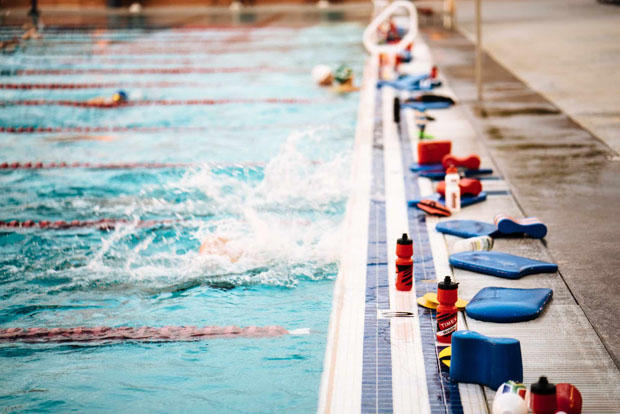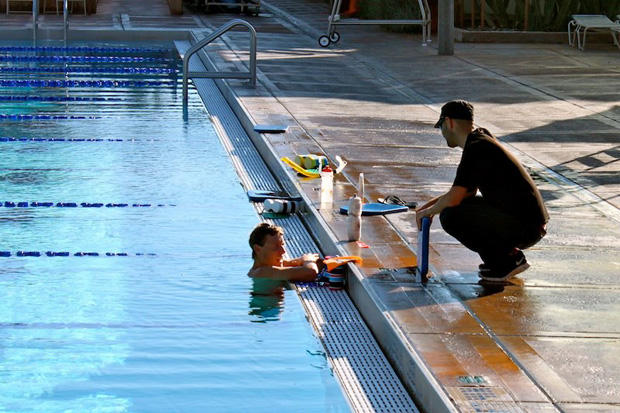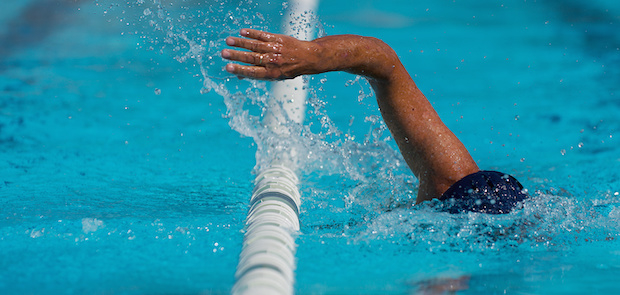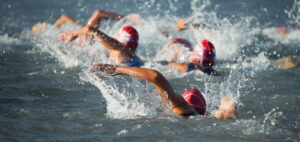Improve Your Swim This Off-Season With a Masters Swim Group

For many people, the swim is the most foreign — and therefore the toughest — of the three sports when getting started in triathlon. You certainly need to work on proper form and technique in cycling and running, but you can get away with gritting your teeth and powering forward in training and racing for those legs of triathlon. It’s a different story with the swim. Yes, you can grind your way through a swim, but it’s going to be a slog, and if you don’t nail down your form, you’ll reach your ceiling in the sport quite quickly.
It’s easy to say you need to improve your form and technique in the water, but how are you supposed to fix those things if you don’t even know where to start? That’s where a masters swim group can change your swim completely. Training with a coach and group will not only help to drastically boost your performance in the pool, but it will likely lead to you actually enjoying your swim sessions rather than simply tolerating them, which in turn will make you an even better swimmer down the line.
Forget the Fear
To really succeed in swimming, you have to embrace being a beginner. You might have jumped into cycling or running and found an immediate groove or success, but it’s likely going to be a different story with swimming. So, first and foremost, accept that you are not going to be the best in the pool when you join a masters team.
In fact, you might be one of the worst and slowest in the pool, which brings us to your second task: getting over your fear of swimming with a group. This is much easier said than done, as it can be intimidating to hop into a pool with a bunch of strangers who not only all know one another, but are also familiar with the operation at practices and much more efficient in the water than you.

You have to remind yourself that, as long as you follow proper pool etiquette, no one is going to have an issue with you being in their lane. Masters swimmers are used to crowded pools, so all you have to worry about is making sure that you don’t get in anyone else’s way when they try to pass you.
How do you do that? Don’t stress when you’re in the middle of a lap — if you feel someone on your feet, just keep swimming. It’s their responsibility to make the pass as safely as possible, so they have to keep an eye on oncoming traffic down the other side of the lane.
Some new swimmers will feel people on their toes and stop in the middle of the lane, which will just cause confusion and chaos as people try to get around you, and it could leave you awkwardly hugging the lane rope as you wait for a long line of swimmers to get by. Instead, wait for the person behind you to make the pass on their own. If they still haven’t passed you by the time you make it to the wall, this is when you can pull off to the side and wait. They likely won’t say anything (they’ll just turn and keep swimming), but you can rest assured that they will appreciate your awareness of them in the water.
Trust the Coach
There is a huge benefit to swimming with other athletes (you’re going to be pushed way harder than you would be if you were always swimming solo), but the main reason to join a masters team is for the coach. They will not only provide you with workouts every practice, but they will also critique your form, teach you proper technique and help you develop into a better, more efficient and stronger swimmer.
The coach will also be able to direct you to the correct lane at practices. Choosing the right lane to swim in is another part of pool etiquette. There are few things more annoying in the pool than someone who thinks they’re better than they actually are and opts for the fast lane instead of the more appropriate medium or slow choices. You don’t want to be that guy or that girl, so let the masters coach pick your lane for you after they get a good look at your stroke and abilities.

(It’s important to note that there is nothing wrong with being slower than your fellow swimmers. No one will fault you for that, but they will be bothered by someone who is too proud to swim in a slower lane even if that’s where they belong at the moment.)
Expand Your Portfolio
Some triathletes will swim breaststroke on race day, but most are used to one stroke: freestyle. That is, of course, the best option for triathlon (which is why the majority of triathletes use it), but just because it’s the stroke you’ll use on race day doesn’t mean that the other strokes can’t help you improve as a swimmer.
Breaststroke, backstroke and butterfly might scare you, but adding them to your portfolio will help you develop a better feel for the water and become more efficient in the pool. They also work different muscles, so tossing them into your weekly training plan can improve imbalances that might occur if you only swim freestyle 100 % of the time.
When you join a masters swim group, you will try each stroke in training. No one will expect you to excel at all four, but your coach will be there to give you helpful tips that will elevate your performance in each movement. You might never use butterfly outside of your weekly masters practices, but even if you don’t, it will help your swim strength overall.

Diving into Races
Many masters teams do more than train together — they race together, too. We get it, it’s intimidating enough to get into the pool to practice with these other swimmers, so how can we expect you to race? Well, it all goes back to that first note of embracing your position as a beginner.
You might be terrible in your first pure swimming race. You might be terrible in your tenth swimming race. You might even feel like you’re terrible at every swimming race you do in your masters career. At the end of the day, though, entering races will help you to become more comfortable and confident in the water, which will pay off in a big way come triathlon season.
Are you going to be a superstar in the pool? Maybe not. But joining a masters swim group could be what you need to become a superstar at your next triathlon.







Adult onset swimmer here. I’d love to try masters but I’ve swam only freestyle for 7 years straight since I started training for tris. Never swam in a group intentionally, don’t really know how to do the other strokes, never done a flip turn in 4 million meters of swimming, mostly dislike drills, kicking, and toys. Should I still try it?
100% you should. Why not? Just tell the group what you told us they would be happy to have you join and learn from them. You could probably teach them how to open water swim too
Yes, do it! Adult onset swimmer who quit doing tri over the pandemic but I joined a master’s swim club this fall and have been having fun learning the other strokes. Nobody in our lane does flip turns unless we’re actively practicing them under a coach’s guidance. In the other lanes it’s a mix of flip and open.
What goggles are those or that an AI Photo. If they are real I’d love a pair.
What a garbage AI pic. Maybe spend some of that ST+ moneys on a proper photo